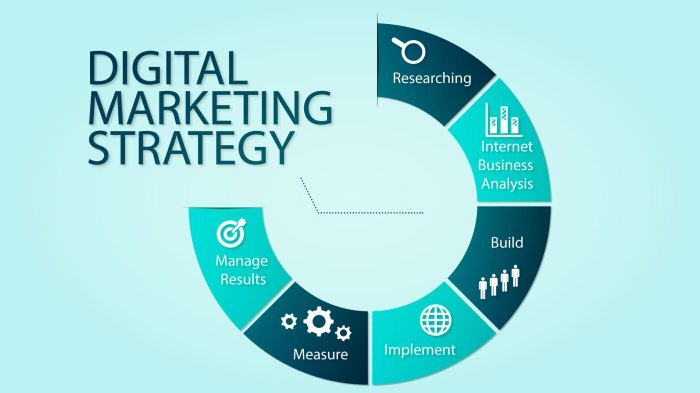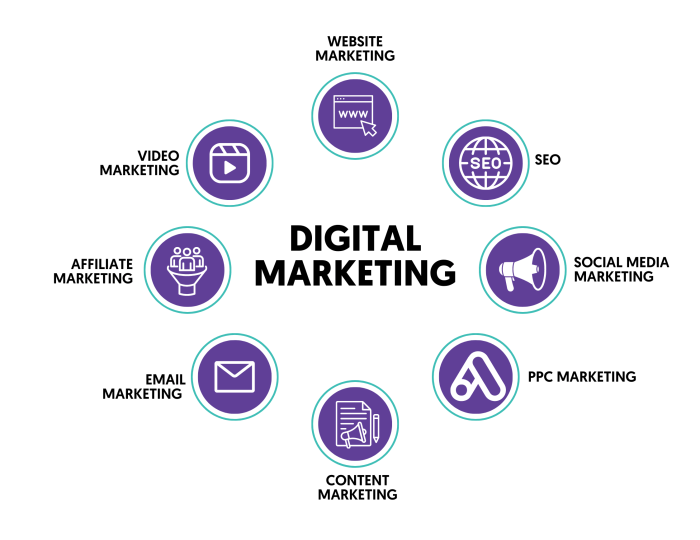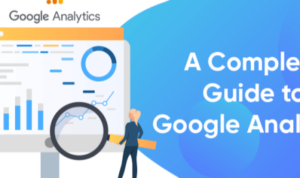Digital Marketing Strategy is the key to unlocking success in the online world, where creativity meets strategy in a dynamic dance of marketing prowess. Dive into the realm of digital marketing and discover the secrets to conquering the digital landscape with finesse.
Overview of Digital Marketing Strategy

In the world of marketing, digital marketing strategy refers to a plan of action aimed at utilizing online platforms and tools to achieve marketing objectives. It involves leveraging various digital channels such as social media, email, websites, and search engines to connect with customers and promote products or services.
Examples of Successful Digital Marketing Strategies
- Content Marketing: Companies like HubSpot have successfully used content marketing to educate their audience, build trust, and generate leads.
- Social Media Marketing: Brands like Nike have effectively used social media platforms to engage with their audience, drive brand awareness, and increase sales.
- Search Engine Optimization (): Websites like Moz have implemented strong strategies to improve their search engine rankings and attract organic traffic.
The Importance of Having a Well-Defined Digital Marketing Strategy
A well-defined digital marketing strategy is crucial for businesses to effectively reach their target audience, increase brand visibility, and drive conversions. It helps businesses stand out in a crowded online space, generate leads, and ultimately achieve their marketing goals. Without a clear strategy in place, businesses may struggle to compete in the digital landscape and reach their full potential.
Components of a Digital Marketing Strategy

In order to create an effective digital marketing strategy, it is crucial to understand the key components that contribute to its success. Each component plays a unique role in achieving marketing goals and must work together seamlessly for a comprehensive strategy.
Website Design and Development
Having a well-designed and user-friendly website is essential for any digital marketing strategy. It serves as the online hub where potential customers can learn about your products or services and ultimately convert into paying customers. A visually appealing and easy-to-navigate website can significantly impact user experience and overall conversion rates.
Search Engine Optimization ()
is the process of optimizing your website to rank higher in search engine results pages. By targeting specific s and creating high-quality content, you can improve your website’s visibility and attract more organic traffic. is crucial for increasing brand awareness and driving relevant traffic to your site.
Social Media Marketing
Social media platforms offer a unique opportunity to engage with your target audience and build brand loyalty. By creating compelling content and interacting with followers, you can increase brand awareness, drive website traffic, and generate leads. Social media marketing is a powerful tool for building relationships with customers and promoting your products or services.
Email Marketing
Email marketing is a cost-effective way to communicate with your audience and nurture leads. By sending personalized and relevant emails, you can stay top-of-mind with customers, promote special offers, and drive conversions. Email marketing is a valuable tool for building relationships with customers and encouraging repeat business.
Pay-Per-Click Advertising (PPC)
PPC advertising allows you to reach a targeted audience through paid ads on search engines and social media platforms. By bidding on s and setting a budget, you can drive traffic to your website and generate leads. PPC is an effective way to quickly increase visibility and drive conversions for your business.
Analytics and Reporting
Analyzing data and measuring the performance of your digital marketing efforts is essential for optimizing your strategy. By tracking key metrics such as website traffic, conversion rates, and ROI, you can make informed decisions and adjust your tactics accordingly. Analytics and reporting provide valuable insights into the effectiveness of your campaigns and help you identify areas for improvement.
Developing a Digital Marketing Strategy
Creating a digital marketing strategy involves several key steps that are crucial for success in the online landscape. From conducting market research to setting measurable goals and KPIs, each phase plays a significant role in shaping your overall strategy.
Steps in Creating a Digital Marketing Strategy
- Identify your target audience: Understanding who your audience is and what they are looking for is essential in crafting a successful digital marketing strategy.
- Set clear objectives: Define what you want to achieve with your digital marketing efforts, whether it’s brand awareness, lead generation, or driving sales.
- Choose the right channels: Determine which online platforms are most suitable for reaching your target audience and align with your objectives.
- Develop compelling content: Create engaging and relevant content that resonates with your audience and encourages interaction.
- Implement tracking and analytics: Set up tracking tools to monitor the performance of your campaigns and make data-driven decisions.
Tips for Conducting Market Research
- Utilize online surveys and questionnaires to gather insights from your target audience.
- Monitor social media conversations and trends to understand what topics are resonating with your audience.
- Study your competitors to identify gaps and opportunities in the market that you can capitalize on.
- Use Google Analytics and other tools to analyze website traffic and user behavior for valuable data.
Setting Measurable Goals and KPIs
- Define specific, measurable, achievable, relevant, and time-bound (SMART) goals for your digital marketing strategy.
- Identify key performance indicators (KPIs) that align with your objectives and provide insights into the success of your campaigns.
- Regularly track and analyze KPIs to measure progress and make adjustments to your strategy as needed.
Implementing a Digital Marketing Strategy
Implementing a digital marketing strategy involves putting the plan into action to reach your target audience and achieve your marketing goals. It requires the actual execution of various tactics and initiatives Artikeld in the strategy.
Tools and Platforms
- Social Media Platforms: Utilize platforms like Facebook, Instagram, Twitter, and LinkedIn to engage with your audience and promote your products/services.
- Email Marketing Software: Tools such as MailChimp or Constant Contact help in creating and sending targeted email campaigns to nurture leads.
- Google Analytics: Monitor website traffic, user behavior, and campaign performance to optimize strategies for better results.
- Content Management Systems (CMS): Platforms like WordPress or Shopify help in creating and managing digital content efficiently.
Monitoring and Adjusting Strategies
It is crucial to monitor the performance of your digital marketing campaigns through key performance indicators (KPIs) such as click-through rates, conversion rates, and engagement metrics. Based on these metrics, adjustments can be made to optimize the strategy for better results. Regularly analyzing data and making data-driven decisions is essential for the success of your digital marketing efforts.
Measuring the Success of a Digital Marketing Strategy
In the world of digital marketing, success is not just about executing a strategy, but also about measuring its impact. By analyzing key metrics and leveraging analytics, marketers can gain valuable insights to optimize their future strategies.
Key Metrics for Measuring Success
- Conversion Rate: This metric measures the percentage of visitors who take a desired action on your website, such as making a purchase or signing up for a newsletter.
- Click-Through Rate (CTR): CTR indicates the percentage of people who clicked on a specific link, ad, or call-to-action.
- Return on Investment (ROI): ROI calculates the profitability of a marketing campaign by comparing the revenue generated to the cost of the campaign.
- Website Traffic: Monitoring website traffic helps assess the effectiveness of your marketing efforts in driving visitors to your site.
Importance of Analytics in Evaluating Campaigns
Analytics play a crucial role in evaluating the performance of marketing campaigns. By analyzing data, marketers can understand customer behavior, identify trends, and make data-driven decisions to enhance their strategies. Utilizing tools like Google Analytics provides valuable insights into website performance, user engagement, and conversion rates.
Best Practices for Analyzing Data
- Set Clear Objectives: Define specific goals and KPIs to measure the success of your digital marketing strategy.
- Track and Monitor Regularly: Continuously monitor key metrics and performance indicators to identify trends and areas for improvement.
- Segment Data: Analyze data based on different segments, such as demographics, geographic location, or device usage, to tailor your marketing strategies accordingly.
- A/B Testing: Conduct A/B tests to compare different variations of campaigns and determine which performs better in achieving your objectives.





